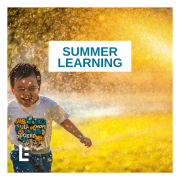Vacation Learning
Summer vacation offers students an opportunity to unwind and relax after what was likely a rigorous school year of learning. While of course they have earned their leisure time, students can intuitively engage in countless learning opportunities over the summer, especially when families are enjoying vacations or day trips. These visits, whether weeks long or merely a day, countries away or in our own backyards, offer different modes of learning than what students see in school. The lessons might not necessarily be rooted in academics, but the various exposure to new things that children have while on vacation offers life lessons spun into new experiences–they also help to cultivate an appreciation for learning through intrinsic motivation.
Middle/High School Ages
An accessible trip to a place that is practically in our own backyards, the nation’s capital is the obvious choice for a day trip or weekend excursion with adolescents.
-
- With numerous museums, and many of them free to the public, DC can keep intrigued history buffs busy for days on end. Allow your child to choose his favorite topic or era and help him explore the vast exhibits, speakers, collections, artifacts, and stories. Whether you end up browsing our nation’s most prized historical documents at the National Archives, or checking out the history of aviation at air and space, the point is to allow children to immerse themselves in new experiences and expand their knowledge of their favorite topics or fields.
- The National Zoo is another nearby option for animal-lovers looking for a day trip. The zoo offers several student-centered camps and special exhibits throughout the summer as well for those learners who would like to get up close and personal.
- A little further north, families can explore the historic battlefield of Gettysburg, where Civil War enthusiasts can tour on horseback, watch reenactments, participate in ranger camps, and take a ghost tour.
- Heading to the beach? Check out a new outdoor game or water sport. Bocce, badminton, shuffleboard, mini golf, paddle boarding, and kayaking—the list is endless when it comes to physical activities and games for the beach. These activities teach adolescents about crucial life skills, such as patience, teamwork, endurance, eye hand coordination, game strategy, etc.
- Beach vacations offer plenty of opportunities for kids to interact with marine life and the surrounding natural environment as well. Even a leisurely activity such as flying a kite or collecting seashells and sea glass can spur a conversation about ocean tides, mollusks, sea life conservation efforts, and lift/drag and aerodynamics.
- Encourage a new hobby or interest that coincides with the vacation. Traveling to a notoriously great food city or hotspot for cultural cuisine? Try looking for a cooking class for the family. Try out different methods or styles of photography; then make a scrapbook of vacation memories. Spending time in the mountains? Consider looking into wilderness training or a survival skills course. Kids can learn about how to use a compass, identify edible vs. harmful plants, practice geotagging, how to successfully build and start a campfire, how to spot and identify animal tracks—again, the list goes on and on!
- If you are going to be in the car or taking a long flight, stock up on literature for the kids, but make sure it’s something that they would actually want to read. Even a sports or fashion magazine beats no reading at all. If your child is more into puzzles or brain games, pick up a book of crosswords, word searches, Sudoku, Rebus puzzles, or trivia questions. Almost all of these items are available digitally through a smartphone app as well.
- If you’re visiting a new city or region that is rich in music or art, create a playlist that represents that genre of music. Again, the idea is to expose adolescents to new cultures, ideas, and experiences.




